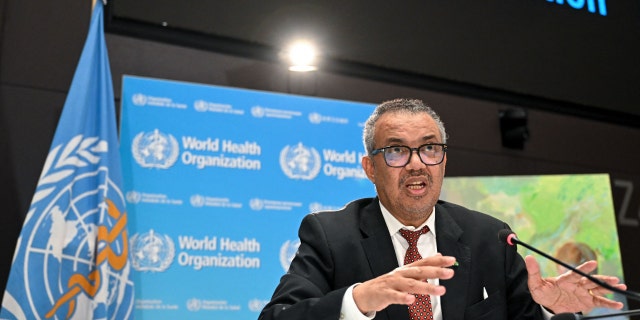Health
WHO chief warns of future pathogens with ‘even deadlier potential’ than COVID-19

The head of the World Health Organization warned Monday the world must prepare for the next global pandemic, warning that the consequences could be even deadlier in the future.
“The threat of another variant emerging that causes new surges of disease and death remains, and the threat of another pathogen emerging with even deadlier potential remains,” WHO director-general Dr. Tedros Adhanom Ghebreyesus told a meeting of the World Health Assembly in Geneva, noting that pandemics are “far from the only threat we face.”
Tedros stressed that the international community “cannot kick this can down the road.”
“If we do not make the changes that must be made, then who will? And if we do not make them now, then when? When the next pandemic comes knocking — and it will — we must be ready to answer decisively, collectively and equitably,” he stressed.
NEW YORK DEPARTMENT OF HEALTH TO REPEAL COVID-19 VACCINE MANDATE FOR HEALTH CARE WORKERS
World Health Organization chief Dr. Tedros Adhanom Ghebreyesus speaks during a press conference on the World Health Organization’s 75th anniversary in Geneva, on April 6, 2023. (Photo by FABRICE COFFRINI/AFP via Getty Images)
Tedros said that it was encouraging and a “relief” to see life “return to normal,” although cases are still spreading, and he said the pandemic has shown that the world’s populace needs to be “better protected.”
The U.S. ended its public health emergency on May 11. Earlier in the month, the WHO officially ended the COVID-19 global health emergency.
However, while the pandemic has “been on a downward trend,” Tedros noted in a previous briefing that the virus was still “killing and changing.”

A screen shows World Health Organization chief Dr. Tedros Adhanom Ghebreyesus speaking during opening ceremony of Asia Summit on Global Health at Hong Kong Convention and Exhibition Center on May 17, 2023, in Hong Kong. (Photo by Li Zhihua/China News Service/VCG via Getty Images)
BIDEN’S ‘PANDEMIC TREATY’ WOULD SURRENDER POWER TO WHO BUREAUCRATS, HOUSE REP WARNS
Just days ago, a WHO advisory group recommended that booster shots for this year be updated to target one of the currently dominant XBB variants.
“The risk remains of new variants emerging that cause new surges in cases and deaths,” said Tedros.

World Health Organization chief Dr. Tedros Adhanom Ghebreyesus speaks during a press conference on the World Health Organization’s 75th anniversary in Geneva, on April 6, 2023. (Photo by FABRICE COFFRINI/AFP via Getty Images)
More than three years after the pandemic’s start, the virus has caused an estimated 766 million cases globally, and nearly 7 million deaths, according to the WHO Coronavirus Dashboard.
Tedros said in that announcement that many mistakes were made, including a lack of coordination, equity and solidarity.
“We must promise ourselves and our children and grandchildren, that we will never make those mistakes again”, he said.
Reuters contributed to this report.

Health
Semaglutide Pills and Injections Vs. Drops: Experts Weigh In | Woman's World

Sign Up
Create a free account to access exclusive content, play games, solve puzzles, test your pop-culture knowledge and receive special offers.
Already have an account? Login
Use left and right arrow keys to navigate between menu items.
Use escape to exit the menu.
Health
Jennifer Hudson Lost 80-Lbs Without Depriving Herself—Learn Her Secrets

Sign Up
Create a free account to access exclusive content, play games, solve puzzles, test your pop-culture knowledge and receive special offers.
Already have an account? Login
Use left and right arrow keys to navigate between menu items.
Use escape to exit the menu.
Health
Kennedy’s Plan for the Drug Crisis: A Network of ‘Healing Farms’

Though Mr. Kennedy’s embrace of recovery farms may be novel, the concept stretches back almost a century. In 1935, the government opened the United States Narcotic Farm in Lexington, Ky., to research and treat addiction. Over the years, residents included Chet Baker and William S. Burroughs (who portrayed the institution in his novel, “Junkie: Confessions of an Unredeemed Drug Addict”). The program had high relapse rates and was tainted by drug experiments on human subjects. By 1975, as local treatment centers began to proliferate around the country, the program closed.
In America, therapeutic communities for addiction treatment became popular in the 1960s and ’70s. Some, like Synanon, became notorious for cultlike, abusive environments. There are now perhaps 3,000 worldwide, researchers estimate, including one that Mr. Kennedy has also praised — San Patrignano, an Italian program whose centerpiece is a highly regarded bakery, staffed by residents.
“If we do go down the road of large government-funded therapeutic communities, I’d want to see some oversight to ensure they live up to modern standards,” said Dr. Sabet, who is now president of the Foundation for Drug Policy Solutions. “We should get rid of the false dichotomy, too, between these approaches and medications, since we know they can work together for some people.”
Should Mr. Kennedy be confirmed, his authority to establish healing farms would be uncertain. Building federal treatment farms in “depressed rural areas,” as he said in his documentary, presumably on public land, would hit political and legal roadblocks. Fully legalizing and taxing cannabis to pay for the farms would require congressional action.
In the concluding moments of the documentary, Mr. Kennedy invoked Carl Jung, the Swiss psychiatrist whose views on spirituality influenced Alcoholics Anonymous. Dr. Jung, he said, felt that “people who believed in God got better faster and that their recovery was more durable and enduring than people who didn’t.”
-
/cdn.vox-cdn.com/uploads/chorus_asset/file/25822586/STK169_ZUCKERBERG_MAGA_STKS491_CVIRGINIA_A.jpg)
/cdn.vox-cdn.com/uploads/chorus_asset/file/25822586/STK169_ZUCKERBERG_MAGA_STKS491_CVIRGINIA_A.jpg) Technology1 week ago
Technology1 week agoMeta is highlighting a splintering global approach to online speech
-

 Science1 week ago
Science1 week agoMetro will offer free rides in L.A. through Sunday due to fires
-
/cdn.vox-cdn.com/uploads/chorus_asset/file/23935558/acastro_STK103__01.jpg)
/cdn.vox-cdn.com/uploads/chorus_asset/file/23935558/acastro_STK103__01.jpg) Technology1 week ago
Technology1 week agoAmazon Prime will shut down its clothing try-on program
-

 News1 week ago
News1 week agoMapping the Damage From the Palisades Fire
-
/cdn.vox-cdn.com/uploads/chorus_asset/file/25826211/lorealcellbioprint.jpg)
/cdn.vox-cdn.com/uploads/chorus_asset/file/25826211/lorealcellbioprint.jpg) Technology7 days ago
Technology7 days agoL’Oréal’s new skincare gadget told me I should try retinol
-
/cdn.vox-cdn.com/uploads/chorus_asset/file/25832751/2192581677.jpg)
/cdn.vox-cdn.com/uploads/chorus_asset/file/25832751/2192581677.jpg) Technology3 days ago
Technology3 days agoSuper Bowl LIX will stream for free on Tubi
-

 Business5 days ago
Business5 days agoWhy TikTok Users Are Downloading ‘Red Note,’ the Chinese App
-
/cdn.vox-cdn.com/uploads/chorus_asset/file/25835602/Switch_DonkeyKongCountryReturnsHD_scrn_19.png)
/cdn.vox-cdn.com/uploads/chorus_asset/file/25835602/Switch_DonkeyKongCountryReturnsHD_scrn_19.png) Technology1 day ago
Technology1 day agoNintendo omits original Donkey Kong Country Returns team from the remaster’s credits















